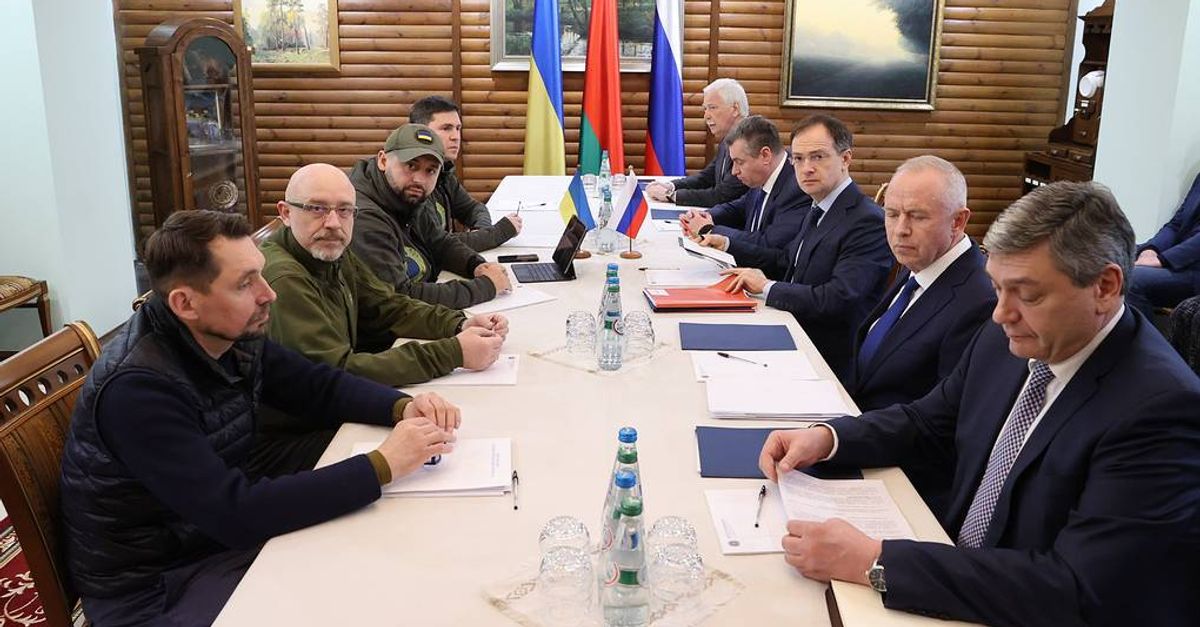Speaking in an interview with the website of the Strategic Council on Foreign Relations, Seyed Reza Mirtaher referred to Russia’s conditions for ending the war with Ukraine including the country should suspend its military activities and recognize Russia’s sovereignty over Crimea and independence of the Donetsk and Luhansk republics and noted: Ever since Russia launched its invasion on Ukraine, efforts were made to mediate, but Russia has set conditions that indicate it is after forming a buffer state between Russia and the West.
Saying that with those conditions Russia wanted to eliminate any possible NATO invasion, he added: Accepting those conditions is tantamount to loss of Ukraine’s territorial integrity, its disintegration and severe weakening, and loss of its geopolitical position which is somehow located in the heart of Europe and before the recent incidents, with an area of 603 thousand square kilometers, was the widest and the most extensive European country.
Unlikeliness of Ukraine accepting Russia’s terms
The international affairs expert referred to the negative response of the Ukrainian government and President Zelensky himself to those demands and said: It seems unlikely that in any possible negotiations between Zelensky and Putin, the Ukrainians accept those conditions, especially that after several weeks of war in Ukraine, it has become clear that the Russians are not able to achieve their goals easily. Therefore, the Ukrainians will not simply accept to give Russia such important concessions.
Mirtaher continued: With the passage of time and the erosion of the war, it can be expected that at simultaneously with the increase in Western aid and the impact of very crushing economic, trade and banking sanctions on Russia, Moscow will be forced to reconsider its terms or basically stop the war.
He explained: Given that in the divisions, the interests of countries are divided into three categories of vital, fundamental and important interests, the territorial integrity of a country is one of the vital interests and disintegration of a country will deal a severe blow to it. Therefore, it seems unlikely that the Ukrainians will simply agree to the disintegration of more than a quarter of their country.
The international affairs analyst, saying that after a few weeks, the Russians have not even been able to capture Kharkiv, which is 20 km from the Russian border, said: Those issues show that it is very unlikely that Russia will be able to carry out the conquests it has already promised.
Possibility of an Erosive War
Regarding the prospects of the Ukraine war and the possibility of a change in Russia’s terms, Mirtaher said: Given the conditions on the ground, it seems that we will be witness to the continuation of a war of attrition; because the Russians do not seem to be able to achieve decisive victories, especially since the morale of the Ukrainians is growing day by day, and at the same time, their frequent attacks on logistics convoys and armored and mechanized columns and the downing of a significant number of Russian aircraft in all, has made Russia’s military situation less favorable.
He reminded that at first, Putin thought that with rapid progress he would win a decisive victory and force Ukraine to negotiate, but in practice the progress of the Russians was slow and has now stopped, stressing: With those conditions continuing, it is unlikely that Russia will be able to achieve significant conquests in the near future so that it can use them as a trump card to impose its demands on the Kiev government.
The expert on international affairs, regarding the possibility of the acceptance of the end of war by Russia, despite the non-fulfilment of its conditions, he said: Putin’s decision is very important as the main decision maker. If he concludes that his country can continue its path, given the harsh sanctions of the Western bloc and its allies against Russia, which cover all vital aspects of the country, in order to maintain his popularity in Russia, and does not lose the chance of victory in the 2024 parliamentary elections, he will naturally continue the war.
Mirtaher, meanwhile, said that continuation of the war in the current way is worrying for Russia, and that with such process they will have to make a quick and rapid move to achieve a decisive victory, adding: If Putin’s view is that with the current situation and the condition of Russian armed forces, there is little hope of gaining decisive achievements, he will have to make significant changes in the current process.
According to the international affairs expert, under the current situation, Putin’s decision to invade Ukraine has been severely brought under question, and some analysts believe that the United States and Europe have set a trap for Russia to enter the war with Ukraine, in order to gain the required pretext for a dealing a severe blow to the Russian economy. The current evidence also shows that the developments are not in the best interest of the Russians, and that those conditions are likely to undermine Putin’s legitimacy.
Mirtaher said that under such situation, the most unprecedented US sanctions against Russia are being implemented, adding: Weakening of Russia’s economy, massive sanctions and widespread outflow of capital and dollars from Russia are underway, and sanctions against the energy sector will soon hit the government hard. Combination of those issues, which brings correctness of Russia’s decision under question and has worried many Russian officials over the consequences, does not provide a clear prospect for the fulfillment of Putin’s conditions.










0 Comments